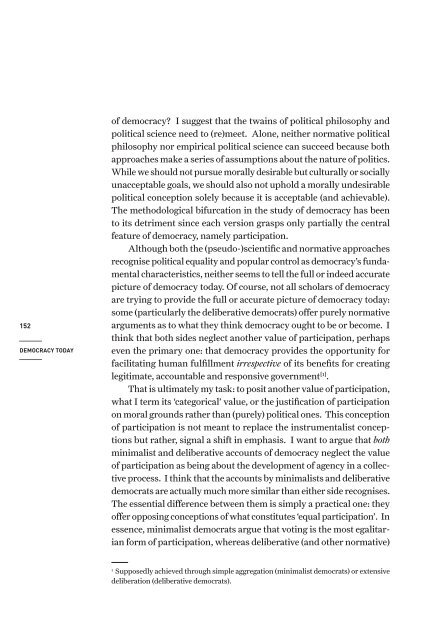Democracy Today.indb - Universidade do Minho
Democracy Today.indb - Universidade do Minho
Democracy Today.indb - Universidade do Minho
Create successful ePaper yourself
Turn your PDF publications into a flip-book with our unique Google optimized e-Paper software.
152<br />
DEMOCRACY TODAY<br />
of democracy? I suggest that the twains of political philosophy and<br />
political science need to (re)meet. Alone, neither normative political<br />
philosophy nor empirical political science can succeed because both<br />
approaches make a series of assumptions about the nature of politics.<br />
While we should not pursue morally desirable but culturally or socially<br />
unacceptable goals, we should also not uphold a morally undesirable<br />
political conception solely because it is acceptable (and achievable).<br />
The metho<strong>do</strong>logical bifurcation in the study of democracy has been<br />
to its detriment since each version grasps only partially the central<br />
feature of democracy, namely participation.<br />
Although both the (pseu<strong>do</strong>-)scientific and normative approaches<br />
recognise political equality and popular control as democracy’s fundamental<br />
characteristics, neither seems to tell the full or indeed accurate<br />
picture of democracy today. Of course, not all scholars of democracy<br />
are trying to provide the full or accurate picture of democracy today:<br />
some (particularly the deliberative democrats) offer purely normative<br />
arguments as to what they think democracy ought to be or become. I<br />
think that both sides neglect another value of participation, perhaps<br />
even the primary one: that democracy provides the opportunity for<br />
facilitating human fulfillment irrespective of its benefits for creating<br />
legitimate, accountable and responsive government [1] .<br />
That is ultimately my task: to posit another value of participation,<br />
what I term its ‘categorical’ value, or the justification of participation<br />
on moral grounds rather than (purely) political ones. This conception<br />
of participation is not meant to replace the instrumentalist conceptions<br />
but rather, signal a shift in emphasis. I want to argue that both<br />
minimalist and deliberative accounts of democracy neglect the value<br />
of participation as being about the development of agency in a collective<br />
process. I think that the accounts by minimalists and deliberative<br />
democrats are actually much more similar than either side recognises.<br />
The essential difference between them is simply a practical one: they<br />
offer opposing conceptions of what constitutes ‘equal participation’. In<br />
essence, minimalist democrats argue that voting is the most egalitarian<br />
form of participation, whereas deliberative (and other normative)<br />
1<br />
Supposedly achieved through simple aggregation (minimalist democrats) or extensive<br />
deliberation (deliberative democrats).
















